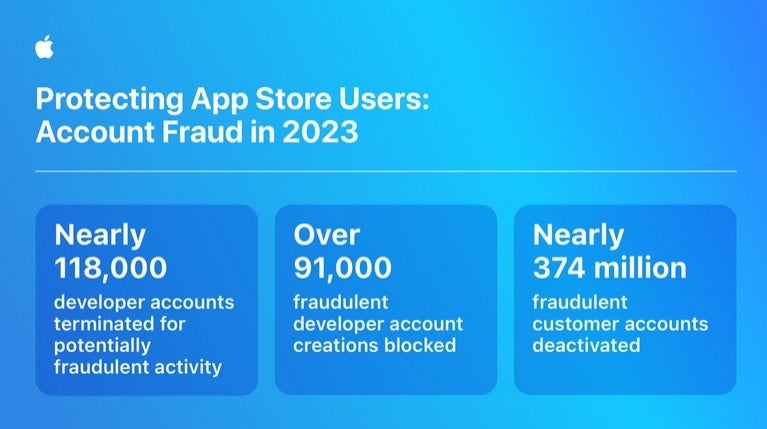Apple Blocks $7 Billion in App Store Fraud, Emphasizes Security Measures
Apple has recently released its fourth annual fraud prevention analysis, revealing that it has prevented over $7 billion in potentially fraudulent transactions on the App Store between 2020 and 2023. This announcement comes as the tech giant continues to defend its App Store policies and security measures.
Key Findings:
- In 2023 alone, Apple blocked $1.8 billion in suspicious transactions
- Over 14 million stolen credit cards and 3.3 million fraudulent accounts were prevented from making transactions
- 1.7 million app submissions were rejected for failing to meet privacy, security, and content standards
App Review Process
Apple's App Review team, consisting of over 500 staff members, reviewed more than 6.9 million app submissions in 2023. The company highlighted several areas of focus:
- Bait-and-Switch Apps: 40,000 apps were removed for engaging in deceptive practices
- Hidden Features: Nearly 38,000 apps were rejected for undocumented or hidden features
- Privacy Violations: Approximately 375,000 apps were blocked due to privacy concerns
- Copycat and Spam Apps: 248,000 app submissions were rejected for being spam, copycats, or misleading
User Protection Measures
Apple also implemented several measures to protect users:
- Removed over 150 million fraudulent ratings and reviews
- Terminated 374 million developer and customer accounts since 2020
- Blocked 47,000 illegitimate apps from unauthorized app stores
Implications for EU Sideloading Regulations
This report comes at a time when Apple is facing pressure from EU lawmakers to allow sideloading of apps. The company has long argued against this practice, citing security and privacy concerns. By highlighting its success in preventing fraud, Apple may be attempting to reinforce its stance on maintaining strict control over app distribution.
Conclusion
While Apple's efforts to combat fraud are impressive, the decrease in some metrics from 2022 to 2023 suggests that their security measures may be becoming more effective at preventing fraudulent activities before they occur. As the digital landscape continues to evolve, it remains to be seen how Apple will balance user protection with increasing demands for more open app ecosystems.
